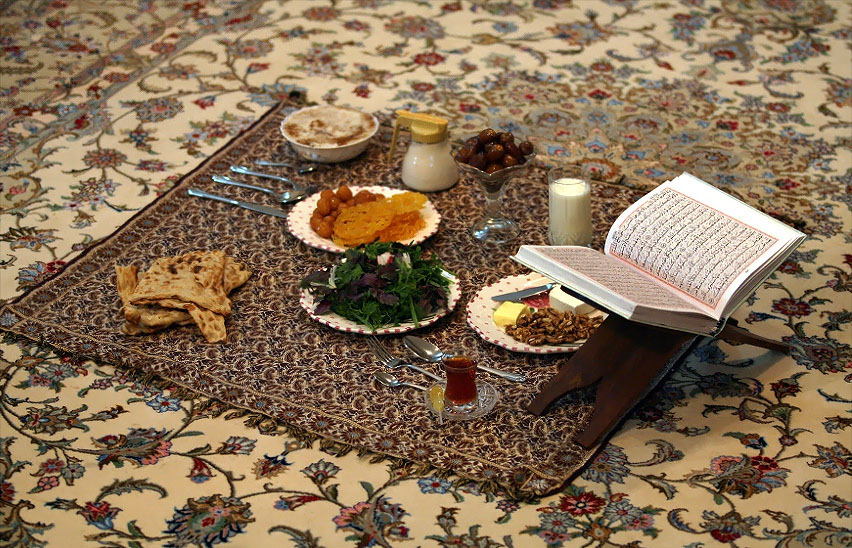SHARES

What is Ramadan?
Ramadan falls on the 9th month of the Islamic calendar. It is a time where observers of the Islam religion will fast from sunrise till sundown. Replacing the typical routine of three meals day are the morning meal (Suhur) and evening meal (Iftar). Suhur is taken before dawn; for Iftar, after sunset.
Types of food served during these meals may differ according to the region Muslims reside in.

An Iranian Iftar meal in Ramadan. By sayyed shahab-o- din vajedi [CC BY 4.0]
Who can fast?
All Muslims are encouraged to fast as it is one of the requirements stated under Islam’s Five Pillars. However, certain exceptions are to be made when fasting may put an individual’s health at risk. Such individuals can include (list is non-exhaustive):
- The elderly (or those with incurable illnesses)
- The sick
- The mentally ill
- Travelling individuals
- Those with poorly controlled diabetes (or conditions related to diabetes, eg. heart and kidney problems)
- Those at risk of high blood sugar (hyperglycemia) or low blood sugar (hypoglycemia)
- Pregnant/menstruating women, or women nursing newborn children
What should we eat?
Traditionally, dates are consumed at the start of Iftar to symbolize the breaking of a fast. It is high in potassium and fiber, making it a necessity in the diets of Muslims; unfortunately, it also contains high amounts of sugar so be careful not to overeat them! 1 or 2 dates per Iftar should suffice.
It is encouraged to consume foods that are complex carbohydrates. In other words, they are harder to digest, and hence help the body release energy slowly – it can keep you feeling full for longer periods of time. Examples are whole grains, whole meal bread, potatoes with the skin on, brans, and cereals.

Brown rice and other complex carbohydrates are great in keeping us full for a longer time. By jules / stonesoup (par cooked brown rice) [CC BY 2.0]
Lean protein is also where we can obtain energy to last the day during Ramadan. Skinless chicken, legumes, fish, eggs, lean veal, or moderate amounts of prawns, are terrific sources.
Last but not least, low-fat dairy products like cheese and skimmed milk are also great sources of energy and nutrition.

Dates and a glass of milk to break fast. By Looi (Own work) [Public domain]
What should we NOT eat?
It is important to refrain from caffeinated drinks, most recognisably coffee and tea. Caffeinated drinks are diuretic; in other words, such drinks help your body expel water in a quicker fashion – not an ideal situation if we aim to keep ourselves hydrated throughout the day. Furthermore, ample rest is needed to get us going the next day, and caffeinated drinks will do the exact opposite by keeping you awake at night!
It is advisable not to take caffeinated drinks during the Ramadan season due to its diuretic qualities. By Julius Schorzman (Own work) [CC BY-SA 2.0]
Try to limit the use of butter, ghee or oil in the cooking of meals; instead, substitute such substances with vegetable oils high in unsaturated fats, such as canola oil and soybean oil. For the optimum method of cooking, it is beneficial to opt for steaming, grilling, baking, or shallow frying. The difference in taste tends to be negligible; in fact, in some instances, it actually brings out the taste of the meat more favourably, especially with white meats like chicken and fish.

Use vegetable oils in small amounts for a healthy and lasting meal. By Veganbaking.net from USA (Canola Oil) [CC BY-SA 2.0]
Other things that observers of the Ramadan period should steer clear of will be (but not restricted to):
- Sugary beverages, such as sugared fruit juices and coke
- Fatty meats
- Liver and organ meats
- Whole milk, ice cream, full cream yogurt, creamy sauces
Other handy tips
Eat smaller and more frequent meals during non-fasting hours, as compared to binge eating on lesser and heavier meals – doing this will keep one’s metabolism constant and running high. This fact is backed up by a scientific research completed by Duke University. Time to stop on all the binge eating, and exercise some self-discipline!
Some individuals are uncertain if insulin injections or blood glucose monitoring will disrupt one’s fasting cycle. Be rest assured that such actions provide no nutritional value, they will not actually break one’s fast! In light of the risk of hyperglycemic events, it is crucial for one to check their blood glucose level regularly if the need arises.

Insulin injections do not actually disrupt one’s fasting cycle. By Armin Kübelbeck (Own work) [GFDL or CC BY-SA 3.0]
Last but definitely not the least, have fun while you’re at it – make the best out of every moment you spend with family and friends!
This article is written by Zi Ying, a music enthusiast and food junkie who, of course, still tries to eat healthily. She loves to dance in her free time, which functions both as a robust workout and a tool for de-stress and joy.
by Sara
Certified nutritionist with sports and fitness in my blood. Basketball is my passion and I live by Ali’s saying “don’t count the days, make the days count” View all articles by Sara.




